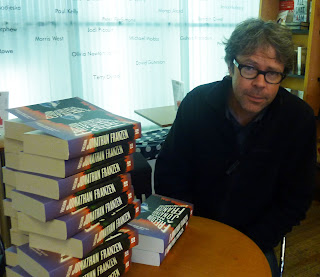 |
| Jonathan Franzen visited Shearer's to sign copies of Freedom |
The energy was palpable as people settled back into their ‘armchairs’ in the majestic Concert Hall anticipating a look behind the front cover of one of their favourite authors. Here was an opportunity for us to experience Jonathan Franzen talking about anything and everything that took his fancy in a relaxed and candid environment.
However, a rather different, but in its own way entertaining evening unfolded as Geordie Williamson, Chief Literary critic for The Australian took the stage next to Franzen. Williamson opened the ‘conversation’ in a nervously over-rehearsed manner and his lengthy questions tended to confuse rather than enlighten the audience. Fortunately Franzen was able to lighten the alienating intellectualism that Williamson seemed bent on straight-jacketing him into. There were some wonderfully long pauses and a genuinely perplexed expression as Franzen deliberated how to bring the questions into a sharper and more entertaining focus.
Franzen is a charming and engaging speaker who is self-assured and unapologetic about his opinions. While this was confrontational for some - one man loudly stormed out while Franzen discussed September 11 - the majority of the audience were instantly won over and captivated by what he had to say.
We meandered through his thoughts on the tyranny of choice which segued into healthcare issues in the US, ideas on freedom: “ I had a job, I knew what my purpose was - that’s freedom to me”, and the ubiquitous 9/11 subject which brought the surprising comment, for some, that he doesn’t accept the on-going and constantly verbalised mantra that “9/11 changed America forever”.
Franzen believes that you cannot be sombre and realistic about 9/11 at the same time. Rather than causing the US to look at itself and re-evaluate how it fits in the world, the White House and the media manipulated the event for their own cynical uses. Franzen claims he does not want to write about 9/11 because of the extensive written and visual media coverage - he doesn’t want to be “the little dog chasing after the truck of history.”
This was an interesting statement for an author whose writing is meant to reflect the state of the US and its people. Yet Franzen is adamant that he never intended to create a portrait of contemporary America. He is resistant to what a novel is ‘supposed’ to do and doesn’t want to justify the novel by making it socially useful. In any case, he says, writing a socially relevant novel becomes obsolete with the next news cycle.
In his last two novels, Franzen’s use of ‘interesting’ families - he insists they are not ‘dysfunctional’- shows his interest in the personal story and the psyche rather than social commentary. Franzen believes that writing about these things is the only way of reflecting the world at large. How he writes, however, has changed over the last ten years.
As an audience member pointed out, Freedom, unlike The Corrections, is not a satire. Franzen describes satire as an angry person’s game and one for which he felt over-rewarded for in the success of The Corrections. With time, Franzen saw that he had unjustly characterised his mother in life and in fiction and did not want to do that again. He now embraces a position of ‘no moral position’ on the characters in his books.
Such egalitarianism was not reserved for the likes of social media. Franzen’s views on technology provided one of the most humorous moments of the night. In a statement that could well be quoted for some time, Franzen declared that “Twitter is basically cigarettes in electronic form.” In the 90s, he thought television and DVDs were the enemy, but with the emergence of Twitter and Facebook he now wants to embrace TV and movies as family. With the high-standard of craftmanship that go into television series today (think HBO), Williamson pointed out that this genre can be seen as highly literary - the modern equivalent of, say, Dickens or Conan Doyle who were published in serial forms. Yet Franzen still believes that film or television can never achieve what a novel can. A novel will always be the master of point of view and irony and is still the best way to articulate moral and emotional shades of grey.
As to the future of the literary novel, how bleak it is depends on which perspective you look at it from. Franzen cheekily explained that when you ask an author how many people read serious literature today, they usually say it’s the same amount as the number of copies they sold of their last book. So if you asked Roth, the number is getting progressively smaller, perhaps around 50,000. If you ask Franzen, there’s millions.
Authors recommended and discussed by Franzen:
Paula Fox
Christina Stead
Alice Munro
Edith Wharton
Don DeLillo
David Foster-Wallace
Written by Joanna & Natalie
We have a limited quantity of autographed copies of Freedom available here.



No comments:
Post a Comment